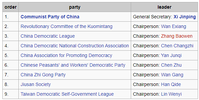Knobby22
Mmmmmm 2nd breakfast
- Joined
- 13 October 2004
- Posts
- 9,816
- Reactions
- 6,798
China has made some poor decisions under Xi.China have miscalculated with their aggressive approach in SE Asia. The Belt and Road debt trap is not working as well as they might have been expecting and may be pushing smaller nations away. Vietnam has been very important and now Philippines is turning back to the US it's going to be very hard to make a solid play for ASEAN support. Indonesia now comes into play as the largest economy in ASEAN and if they change their neutrality policy to one of even the slightest support of US/Australia through joint military exercises (which we already do on a very minor basis) China is definitely surrounded. In the end, geography is actually China's biggest threat. They're trapped.
Buying territory off Pakistan and then having border disputes with India, stealing fishing areas from the Philippines who were previously prepared to be friends, making Vietnam an enemy, destroying their previously good relationship with the USA and us.
They would have been better off increasing their soft power.


